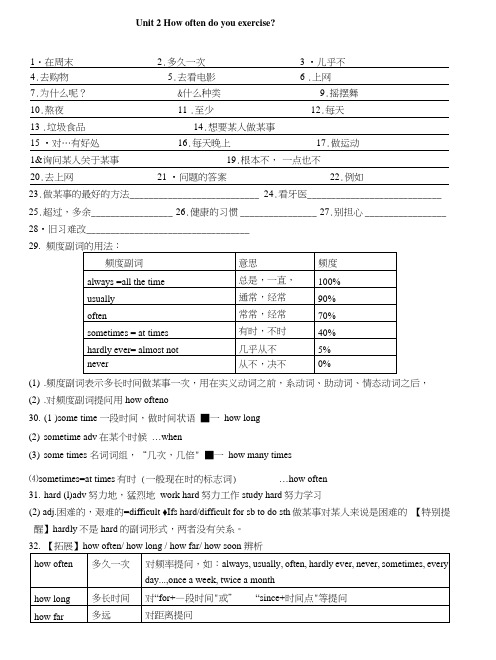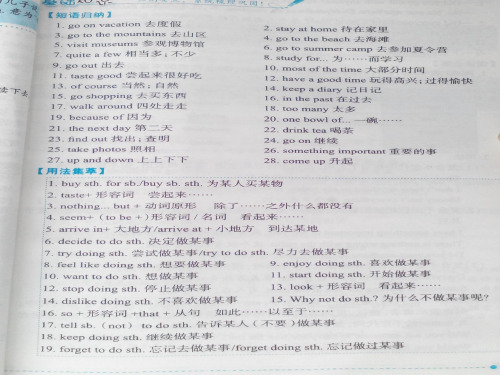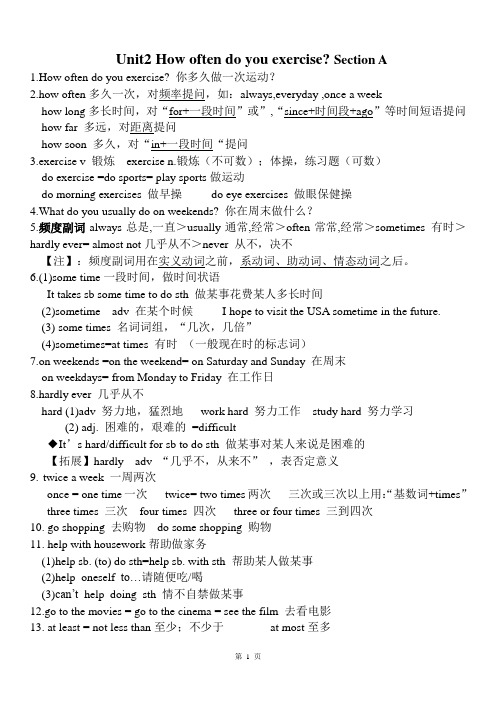八年级英语上册 Unit 2 How often do you exercise?(第3课时)教案 (新版)人教新目标版
- 格式:doc
- 大小:42.50 KB
- 文档页数:3


Unit 2 How often do you exercise?23.做某事的最好的方法___________________________ 24.看牙医____________________________ 25.超过,多余_________________ 26.健康的习惯________________ 27.别担心_________________ 28•旧习难改__________________________________29.频度副词的用法:(1).频度副词表示多长时间做某事一次,用在实义动词之前,系动词、助动词、情态动词之后,(2).对频度副词提问用how ofteno30.(1 )some time 一段时间,做时间状语■一how long(2)sometime adv在某个时候…when(3)some times 名词词组,“几次,几倍" ■一how many times⑷sometimes=at times有时 (一般现在时的标志词) …how often31.hard (l)adv努力地,猛烈地work hard努力工作study hard努力学习(2) adj.困难的,艰难的=difficult ♦Ifs hard/difficult for sb to do sth做某事对某人来说是困难的【特别提醒】hardly不是hard的副词形式,两者没有关系。
32.【拓展】how often/ how long / how far/ how soon 辨析33.次数的表达方法:once = one time —次twice= two times 两次三次或三次以上用:"基数词three times三次four times四次three or four times三到四次【注】:对次数提问用how many times。
help sb. (to) do sth =help sb. with sth.帮助某人做某事36.free ①adj.空闲的be free = have time有时间②adj.自由的,免费的be free to do sth.随心所欲的做某事37.full adj.忙的=busy adj.满的;充满的be full of = be filled with 充满3& least adv.最小,最少at least = not less than 至少;不少于39.health n 健康healthy adj 健康的(反[unhealthy40.although=though conj虽然,即使;不能与but连用,引导让步状语从句41.want sb. to do sth.= would like to do sth.想要某人做某事42.suchas “例如,像……一样”常常列举同类人或物中的几个例子,放在被列举的事物与前面的名词之间。

Unit 2How often do you exercise?
Section B (1a—1e)
一、教学目标
1.熟练掌握重点单词和短语:junk food,coffee,health,be good for,want sb. to do sth.
2. 能够听懂和日常饮食、其他生活习惯有关的对话信息,并能根据信息判断生活习惯健康与否。
3. 能够使用频度副词及How often谈论日常生活习惯话题。
4.合理安排自己的生活,养成良好的生活习惯和饮食习惯,享受健康的生活。
二、教学重点及难点
重点:
能够听懂和日常饮食、其他生活习惯有关的对话信息,并能根据信息判断生活习惯健康与否。
难点:
能够使用频度副词及How often谈论日常生活习惯话题。
三、教学过程
四、板书设计
Unit 2How often do you exercise?
Section B (1a—1e)
Words and phrases:junk food,coffee,health,be good for,want sb. to do sth. How to keep healthy:
A good eating habit.
Exercise often.
Get enough sleep.。


Unit2Howoftendoyouexercise八年级上册英语知识点Unit 2: How often do you exercise?Introduction:In Unit 2, we will explore the topic of exercise and discuss how often individuals engage in physical activity. Physical exercise is crucial for maintaining a healthy lifestyle and achieving optimal physical and mental well-being. Let's delve into the key points of this unit.1. The Importance of Exercise:Regular exercise offers numerous benefits to our bodies and minds. It improves cardiovascular health, strengthens muscles and bones, reduces the risk of chronic illnesses, and increases energy levels. Exercise also plays a crucial role in managing stress, improving sleep patterns, and enhancing overall mood and mental well-being.2. Types of Exercise:There are various types of exercises that cater to different needs and preferences. Here are some common forms of physical activity:a) Aerobic Exercise: This type of exercise focuses on increasing heart rate and breathing. Examples include running, cycling, swimming, and dancing.b) Strength Training: Strength exercises involve resistance training to build muscle strength and endurance. Weightlifting and bodyweight exercises like push-ups and squats fall under this category.c) Flexibility Exercises: Stretching exercises help improve flexibility and joint mobility. Activities such as yoga and Pilates emphasize stretching and relaxation techniques.d) Balance Exercises: These exercises enhance stability and motor coordination. Tai Chi, as well as standing on one leg or using balance boards, are effective in improving balance.3. Exercise Frequency:To achieve optimal health benefits, it is essential to exercise regularly. The frequency of exercise depends on one's age, fitness level, and personal goals. Here are some general guidelines:a) Children and Adolescents (aged 6-17): At least 60 minutes of moderate to vigorous activity should be achieved daily. This can include activities such as sports, cycling, or brisk walking.b) Adults (aged 18-64): Engage in at least 150 minutes of moderate-intensity aerobic activity or 75 minutes of vigorous-intensity aerobic activity per week. Additionally, strength training exercises targeting major muscle groups should be incorporated at least twice a week.c) Older Adults (aged 65 and above): Follow the same guidelines as adults and include activities that improve balance and flexibility, such as yoga or Tai Chi.4. Monitoring Exercise Intensity:To ensure effective workouts, it is crucial to monitor exercise intensity. Monitoring heart rate, perceived exertion, or utilizing fitness trackers can help gauge the intensity level. This allows individuals to adjust and tailor their exercise routines to their specific needs and goals.5. Overcoming Barriers to Exercise:Despite understanding the importance of exercise, many individuals face barriers that hinder their physical activity participation. Common barriers include lack of time, motivation, or access to facilities. To overcome these challenges, it is important to set realistic goals, find enjoyable activities, and create a schedule that accommodates exercise.Conclusion:In Unit 2, we have explored the significance of exercise, different types of exercises, and recommended exercise frequencies for various age groups. Remember, regular physical activity is crucial for maintaining good health and overall well-being. By incorporating exercise into our daily lives, we can lead active, energetic, and happy lifestyles. So, let's prioritize exercise and enjoy the countless benefits it brings.。

Unit2 How often do you exercise? Section A1.How often do you exercise? 你多久做一次运动?2.how often多久一次,对频率提问,如:always,everyday ,once a weekhow long多长时间,对“for+一段时间”或”,“since+时间段+ago”等时间短语提问how far 多远,对距离提问how soon 多久,对“in+一段时间“提问3.exercise v 锻炼exercise n.锻炼(不可数);体操,练习题(可数)do exercise =do sports= play sports做运动do morning exercises 做早操do eye exercises 做眼保健操4.What do you usually do on weekends? 你在周末做什么?5.频度副词always总是,一直>usually通常,经常>often常常,经常>sometimes 有时>hardly ever= almost not几乎从不>never 从不,决不【注】:频度副词用在实义动词之前,系动词、助动词、情态动词之后。
6.(1)some time一段时间,做时间状语It takes sb some time to do sth 做某事花费某人多长时间(2)sometime adv 在某个时候I hope to visit the USA sometime in the future.(3) some times 名词词组,“几次,几倍”(4)sometimes=at times 有时(一般现在时的标志词)7.on weekends =on the weekend= on Saturday and Sunday 在周末on weekdays= from Monday to Friday 在工作日8.hardly ever 几乎从不hard (1)adv 努力地,猛烈地work hard 努力工作study hard 努力学习(2) adj. 困难的,艰难的=difficult◆It’s hard/difficult for sb to do sth 做某事对某人来说是困难的【拓展】hardly adv “几乎不,从来不”,表否定意义9.twice a week 一周两次once = one time一次twice= two times两次三次或三次以上用:“基数词+times”three times 三次four times 四次three or four times 三到四次10.go shopping 去购物do some shopping 购物11.help with housework帮助做家务(1)help sb. (to) do sth=help sb. with sth 帮助某人做某事(2)help oneself to…请随便吃/喝(3)can’t help doing sth 情不自禁做某事12.go to the movies = go to the cinema = see the film 去看电影13. at least = not less than至少;不少于at most至多14. use the Internet 上网15.What’s your favorite program?=What program do you like best?你最喜欢的节目是什么?16.every day 每天= each day 做状语,放在句末,对其提问用how ofteneveryday = daily adj. 每天的,作定语,修饰名词,放在名词之前He exercises every day. 他每天都锻炼。
Unit 2 How often do you exercise一、必背短语。
【教材内容解析】Section A1.What do you usually do on weekends (P. 9)2.on weekends意为“在周末”,泛指每个周末,on the weekend则表示“在这个周末”,特指某个周末;在英式英语中,在周末也可以用at the weekend或者at weekends。
I like going fishing on weekends.He wants to do something special on the weekend.3.help with homework (P. 9)help表示“帮助”时,常用的句型为:help sb. with sth. 帮助某人某事;help sb. (to) do sth. 帮助某人做某事。
Can you help me with my homework?He often helps his mother clean do housework.4.sometimes (P. 9)sometimes是频度副词,意为“有时”,相当于at times。
I sometimes play computer games on weekends.【拓展】辨析sometimes, some times, sometime与some time5.hardly ever (P. 9)hardly作副词,表示“几乎不”;hard用作副词表示“努力地、猛烈地”,作形容词表示“硬的、困难的”。
He hardly works.He works hard.This is a hard work.6.How often do you watch TV?(P. 9)how often意为“多久一次”用来提问频率,常用表示频率的副词或者短语来回答,如twice a week, sometimes, every day, always等。
八年级英语上册 Unit2 How often do you exercise?知识点归纳八年级英语上册 Unit2 How often do you exercise?知识点归纳八年级上Unit2 How often do you exercise?help with housework帮助做家务 on weekends在周末 how often多久一次 hardly ever几乎从不a week每周一次 twice a month每月两次 every day每天 bave time有空gvies去看电影 use the Internet用互联网 swing dance摇摆舞 pla打网球stay up late熬夜;睡得很晚 at least至少 have dance and piano lessons上舞蹈课和钢琴课go to bed early早点睡觉 pla进行体育活动 be good for对……有好处 go camping去野营…at all一点儿也不…… in one’在某人的业余时间ular最受欢迎的such as比如;诸如 old habits die hard积习难改gdentist去看牙医an多于;超过 less than少于 help sb. w帮助某人做某事How about…? ......怎么样?want sb. to do sth.想让某人做某事 How many+可数名词复数+一般疑问句?……有多少……?主语+find+that从句. ……发现…… spend time with sb.和某人一起度过时光It’s+ adj.+ to do sth. 做某事的……的。
ask sb. about sth.向某人询问某事by doing sth. 通过做某事 the best way to do sth.做某事的最好方式What’s your favorite…?= What…do you like best? 你最喜欢的…是什么?ggrandparents_________(one) a w2. He spendan an hour__________(exercise) every daHe didn’t gl. He could ____ ____(hard) read or wTalthy,I decide _______ (exercise) half an hour every daur sweater is beautiful. I want _________(buy) one,How about (go)g on Sundays?He usually study English by (read)gThey always go to bed earlver (熬夜)I gg (一周三次).10.Vegetables are (对……有好处)our healHepla(至少) four time a2.We found only (百分之十五)udents exvery da--_________ _______(多久一次)does your bxercise? --Every da(一个五岁的) girlHer parents are not very because she (几乎从不)helps with housewI always eat junk food,(改为否定句) I __________ eat junk foodaars old.(改为同义句) Mary is girlI gl five days a week.(提问) do you gl a week?Do you wa? (同义句) you?20.She usually watches TV for over two hours a day.(同义句)usually watches TV for two hours a day. 2ats junk food once a week.(对画线部分提问)______ _____ ______she eat junk food?( )22.— do you exercise? —Hardly ever. A.How maB.HowWhen D.How( )23.Tom studies _______. He _______plays wdA. hard; hard B. hardly; hardly C. Hard;hardly D. hardly; hard( )24.Jagh school studUnited StaA.a 18-year-old B.a 18-years-old C.an 18-years-old D.an 18-year-old ( )25. Reading aloudbest way EnglA.to learn B.learning C.to learn D.learns。
Unit 2 How often do you exercise?Section A:1.how often多久一次(向频度副词或表示频度的短语提问)how long多长时间(向表示一段时间的状语提问);多长(向长度提问)how soon多快;多久以后(向表示将来时态的时间提问)how many多少(后接可数名词复数)how much多少(后接不可数名词;还可以用于询问价格或重量。
)how old多大岁数(向年龄提问)how far多远(向距离提问)How come ?怎么会呢?怎么回事?2. take exercise = exercise = do exercise 锻炼do exercises 做练习do morning exercises 做早操do eye exercises做眼保健操play sports = do sports = have sports 做运动3. make a list of列出......的清单make a list of the weekend activities 列出周末活动的清单4. hardly ever 几乎不at times = sometimes=from time to time 有时sometime某个时候some time 一段时间some times 几次5. watch cartoons on TV在电视上看动画片watch a movie / see a film 看电影watch games 看比赛read books / magazines / newspapers看书/杂志/报纸6. (1)Once upon a time 从前(2)at once 马上(3)Once the sun sets, the air turns cold.一旦at once马上once a month 一个月一次twice a year 一年两次three times a week 一个星期三次7. match…with... 把......和......相连;把......和......相匹配8. be free有时间;有空;免费的be free to do sth.随意做某事;自由自在地做某事in one’s free time在某人的空闲时间9. be full for sb.对于某人来说忙或安排很满be full of充满;装满=be filled with10. have dance and piano lessons上舞蹈课和钢琴课swing dance 摇摆舞11. stay up = sit up 熬夜12. at least至少;不少于;起码at most至多;不超过13. be too busy 太忙了'be busy with sth.忙于某事be busy (in) doing sth.忙于做某事14. add... to...给......添加......add up to 总计15. according to 根据/ 视......而定16. ask sb. about sth. 询问某人有关某事ask sb. for sth.向某人要某物ask sb. to do sth.要求某人做某事17. go online上网;上线surf the Internet / surf online 网上冲浪18. be surprised at sth.对某事感到惊讶be surprised to do sth.惊讶地做某事19. for fun好玩;开玩笑地(不是认真地)20. the answers to our questions我们问题的答案the key to the door这门的钥匙。
Unit 2 How often do you exercise?
Section B 1 1a-2e
一.教学目标
1. 语言知识目标:掌握以下单词:percent, online, television, although, body, such as, mind, together, die, writer
2. 情感态度价值观目标:
了解其他学生们的日常生活情况,让学生们知道应如何安排自己的日常生活,向其他有良好生活习惯的人们学习,做一个有良好习惯的人。
二、教学重难点
1. 教学重点:
1) 掌握本课时出现的生词及表达方式。
2) 进行听力训练,提高综合听说能力。
3)阅读短文,获得相关信息,提高学生们的综合阅读能力。
2. 教学难点
1. 听力训练
2. 阅读2b部分的短文并完成相关要求。
三、教学过程
Ⅰ. Warming- up and revision
1. Daily greeting.
2. Check the homework. Let some Ss report what he/she does on weekends.
Ⅱ. Presentation
1. T: Show some pictures of food or drink on the big screen. Ss read the words then discuss they are healthy or unhealthy.
2. Work on 1a. Read the words with the pictures then match the words with the pictures. Ⅲ. Find
1. Show a list of words of food and drinks on the big screen. Then list them into “healthy” or “unhealthy”
2. Check the answer with the Ss.
3. Ask and answer questions about the pictures on 1a. Make a model to the Ss:
T: How often do you drink milk, S1?
S1: I drink milk every day.
T: Do you like it?
S1: No, but my mother wants me to drink it. She says it’s good for my health. Ⅳ. Listening
Work on 1c:
1. Tell Ss that a reporter is interviewing Bill and Tina what their eating habits are. Listen to the recording and find the answer to these two questions: Is Bill healthy? Is Tina healthy? Listen and find the answers to the questions.
3. T: Now let's work on 1d. First, let one student read the sentences and try to know the meaning of the sentences.
4. Play the first time, Ss just listen. Play the tape for the second time for the Ss to listen and find the answers.
5. Check the answers:
6. 听力指导:学生先要抓住这六个问题的意思。
带着这六个问题去对话。
在听的时候,应重
点将与这六个问题相关的回答听清,其他作为非重点内容。
Ⅴ. Pair work
1. Work in pairs. Ask and answer questions. SA is the reporter. SB is Tina or Bill. Ask and answer questions. Then change roles.
e.g. ─How often do you exercise?
─I exer cise every day?
─And how often do you …?
─I exercise …
2. Teacher can walk around the classroom, and give some help to the Ss.
Work on 2a:
1. Let Ss discuss the activities with their classmates and rank these activities according to how often you think your classmates do them.
2. Let some Ss tell their answers.
Ⅵ. Reading
1. T: Here are the results of what the students in No. 5 High School do in their free time. Read the passage quickly and find the answers to the two questions:
1) How many kinds of free time activities are mentioned in the passage?
_______________________________
2) What is the best way to relax? _________________________________
2. Read the passage carefully and complete the pie chart below.
Ss read the passage and try to fill in the pie chart. Then check the answers together. Ⅶ. Reading
1. T: Now let’s read through the five questions. Make sure the Ss know the meaning of the questions. Then let Ss read the passage again and try to find the answers to the questions.
2. 方法指导:首先,应读懂五个题目的意思;然后,认真带着问题去阅读短文。
在短文中找到相关问题的回答依据,并回答上每个问题。
最后,检查一下自己的回答是否正确。
3. Ss read carefully and try to find the answers to the questions.
4. Check the answers with the class.
Ⅷ. Practice
Work on 2d:
1. T: Now let’s make some sentences wit h the percentages using always, usually or sometimes.
2. 方法指导:首先,明确always, usually及sometimes所代表的百分比数值;然后,看再看每个百分比数在短文中相关的活动;最后,造出恰当的句子。
3. Ss read the passage again and try to make some new sentences. Check the answers with each others.
Work on 2e:
1. Let Ss read through the activities in the chart first. Select one activity from them. Then ask their classmates how often they do this activity and make a pie chart.
2. Ss work in groups. Ask and answer questions then fill in the chart.
3. Make a pie chart like those in 2b.
4. Then try to make a short report like the report in 2b.
Homework
1. 读2b中的短文。
2. 根据2e的调查结果写一个报告。
板书设计:。